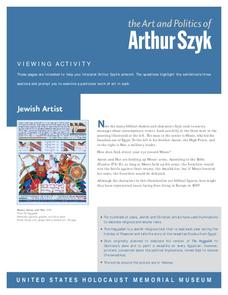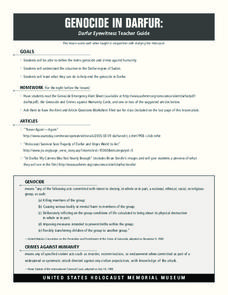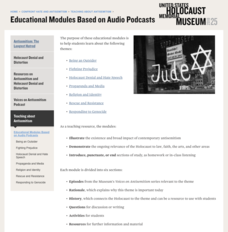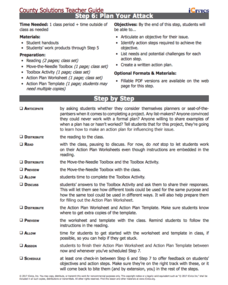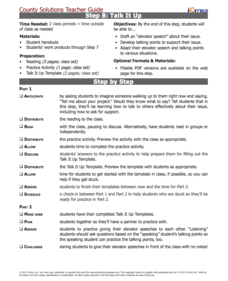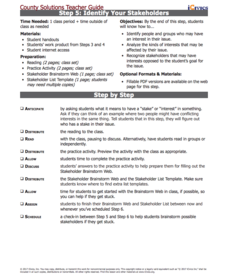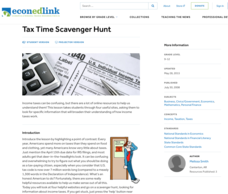US Holocaust Museum
Nazi Olympics: Berlin 1936
The Olympics are about more than sports—at times, the games are also a place of racism and prejudice! Pupils investigate the 1936 Olympics in Berlin, Germany. They analyze the meaning behind the materials included in the United States...
US Holocaust Museum
The Art and Politics of Arthur Szyk
Have you ever listened to a song that had a deeper political meaning to it? Every examined a work of art with layers of meaning? Pupils analyze the drawings of Arthur Szyk. They research the deeper meaning of several artistic cartoons...
US Holocaust Museum
Genocide in Darfur: Darfur Eyewitness Teacher Guide
The events of the Holocaust in World War II would never happen again, right? Scholars research the current genocide taking place in Darfur. Using video and Holocaust Reading Passages, they analyze the horror of this forgotten part of the...
US Holocaust Museum
Defying Genocide
Defying death. Defying those who want to do harm. Defying genocide. Pupils research the events in Rwanda to gain an understanding of what it takes to survive a horrific event like a holocaust. They use video, time lines, and Holocaust...
US Holocaust Museum
Remember the Children: Daniel’s Story
Imagine being a child forced from your home and into a concentration camp during World War II. Scholars prepare for a visit to the United States Holocaust Museum by researching the children of the horrible event. They analyze...
US Holocaust Museum
Educational Modules Based on Audio Podcasts
Imagine hearing someone claim an event like the Holocaust never happened. Pupils use audio podcasts and reading passages to dive into the lives of those impacted by the Holocaust of World War II. Using the information they gather, class...
American Bar Association
News Literacy Model Curriculum in Social Studies
Scholars investigate news literacy in the twenty-first century. They use technology, legal decisions, writings, and digital privacy to analyze the topic. Using what they learned, a group assignment looks into both the challenges and...
iCivics
Step 6: Plan Your Attack
Lights, camera, ACTION! Pupils learn what it takes to set up an action plan to achieve a goal in the sixth installment of a 10-part County Solutions - High School series. They research, analyze, and work together to create a plan of...
iCivics
Step 9: Grab People’s Attention
Attention! Attention! Scholars investigate the concept of attention-grabbers in advertising a product or a cause. They use the ninth installment of a 10-part County Solutions - High School series to analyze t-shirts, bumper stickers,...
iCivics
Step 8: Talk It Up
You have 30 seconds to sell your idea ... go! Scholars master the art of the elevator pitch in the eighth step of a 10-part series. They use research, practice, and step-by-step planning to gain a better understanding of the method....
iCivics
Step 7: Fill the Holes
It's time to communicate without using emojis or hashtags! In the seventh step of a 10-part County Solutions - High School unit scholars analyze professional communication when accomplishing a goal. They use examples, research, and data...
iCivics
Step 5: Identify Your Stakeholders
Have you ever had a goal, but needed help achieving it? Scholars analyze the purpose of stakeholders in the fifth installment of a 10-part County Solutions - High School series. They investigate finances, personal concerns, geography,...
iCivics
Step 4: Consider the Context
Have you ever noticed how deep the roots of a tree or plant stretch? Scholars analyze the context of an issue and the root causes that go to the base of the problem. The fourth step of a 10-part County Solutions - High School unit shares...
iCivics
Step 2: Find What You Need
Have you ever searched for something on the web only to get 50,000 results? Scholars analyze ways to break down an inquiry to get specific results. The second installment of a 10-part County Solutions - High School series researches...
iCivics
Step 1: Change the World?
Want to change the world? Where do you begin? Scholars analyze the steps that must take place to make change in society. The first installment of a 10-part County Solutions - High School series brings the real world to the forefront as...
Council for Economic Education
Tax Time Scavenger Hunt
Is a 1040EZ tax form really easy? Scholars investigate the complexities of the United States taxation system with an economics lesson. Using a wide variety of web sources, they interpret IRS taxation rules and regulations to better...
Council for Economic Education
Banks and Credit Unions (Part 1)
Imagine you have money you want to save ... where do you put it? Pupils investigate the similarities and differences of banks and credit unions as they determine where exactly to place their hard-earned money. Through a WebQuest, they...
Council for Economic Education
Loan Amortization - Mortgage
When you buy a home for $100,000, you pay $100,000—right? On the list of important things for individuals to understand, the lesson presents the concept of interest rates and loan amortization using spreadsheets and online sources....
Council for Economic Education
Opportunity Cost
The price of those new shoes involves more than just money! Individuals explore the concept of opportunity cost using a video clip and gratification discussions. They prepare a budget based off of their set of values in regards to...
Council for Economic Education
Specialization and the Decathlon
Michael Phelps, the economist? Scholars research the economic advantages of specializing in one kind of service, and how it relates to athletes doing the same in their respective sports. They evaluate absolute advantage, production, and...
Council for Economic Education
Jokes, Quotations, and Cartoons in Economics
Humor offers a great tool teach the basics of economics to scholars via video clips, satire, and political cartoons. Individuals create their own economic humor to present to the class—with the assistance of Daryl Cagel's online...
Federal Reserve Bank
The Story of the Federal Reserve: High School Lesson Plan
Is there a bank for the banks? Pupils analyze the complexities of the Federal Reserve system by breaking it down into easy-to-understand sections. Step-by-step investigation using flow charts and graphs of how the monetary system works...
Council for Economic Education
The Role of Government: The Federal Government and Fiscal Policy
Give learners a crash course in balancing the books on the United States federal government level with an economics and government resource. Class members engage in a warm-up discussion and brainstorming session before answering...
Deliberating in a Democracy
Marriage and the State
What defines marriage in society? Scholars investigate the moral and legal arguments of what defines marriage. They analyze different marriage traditions and social customs around the world along with Supreme Court decisions. Individuals...



